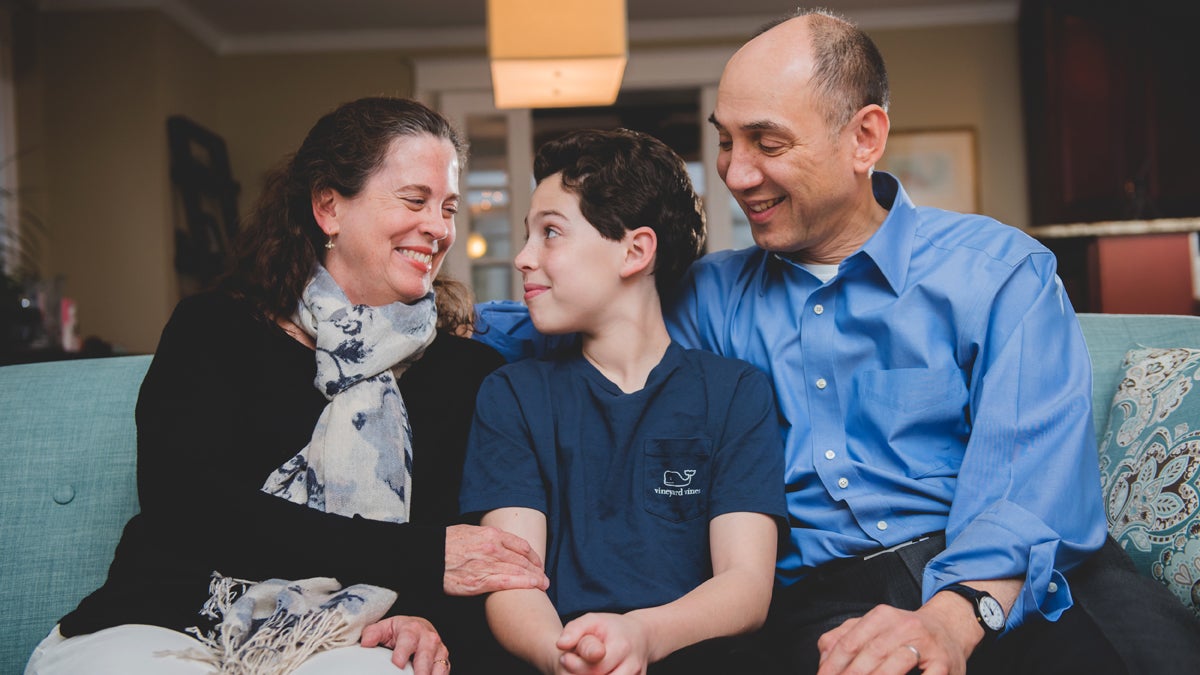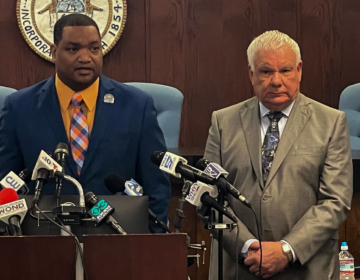In my mixed-race marriage, the rose-colored glasses come off
To prevent people from making racially charged comments, should we talk right up front about my husband's race, or do we just hope they'll not be racist all on their own?

The author and her husband are shown with their son. (BG Productions)
This year marks the 50th anniversary of Loving v. Virginia, the U.S. Supreme Court case that overturned state laws banning interracial marriage. Over five decades, interracial relationships have become more common across the United States, but those couples still face some unique challenges.
Inspired by “The Loving Project,” a podcast featuring the stories of mixed-race couples, we are asking readers to submit essays about their own experiences.
—
With all of the conversations inspired this year by the presidential election and the many changes it has brought about, what has struck me most of all is the sudden clearing up of the rose-colored glasses that a lot of very well-meaning and social-justice-oriented white people have long worn. People like my parents.
Not that they didn’t see problems in our society before, and not that they didn’t have difficult experiences that shaped their lives. My mother, for example, had lost both her parents by the time she turned 13. However, she talks about how lucky she was in many ways. She had relatives who wanted to raise her. And she had money to pay for college and travel.
My father grew up relatively poor but also tells about being lucky to have been able to travel the world as part of his service in the Korean War, and to have received benefits from the G.I. Bill, making him the first in his family to go to college. My parents’ general optimism about life and intense curiosity about people, other cultures, and the world was a good foundation for making me a pretty positive person with a fine set of rose-colored glasses.
But some experiences I had while I was growing up in my still racially segregated Philadelphia suburb in the ’70s and ’80s started to clear up that tint.
In 1973, reading “Anne Frank: The Diary of a Young Girl” in 4th grade challenged my faith in the goodness of humanity forever.
In 1978, a girl in middle school physically jumped a few inches away from me when she found out that I was partly Jewish.
In 1979, the town’s private swim club debated whether to allow a black family to join.
In 1980, my best friend was the first white girl in our high school to date a black boy — such a surprising event at the time to most of our classmates that they only asked me about their relationship, and never her directly. She did not tell her parents about this relationship.
And since high school, I have heard hundreds and hundreds of little comments about girls and women. I have myself experienced indignity, and sometimes outright terror, in seemingly ordinary situations. Every woman knows what I am talking about.
All of these experiences shaped my view and expectations of people.
Flash forward to 1999, when I met my husband. We connected immediately and realized we had a lot in common. He is very light-skinned, and I didn’t know he was African-American until he asked me if I had ever dated a black man. This was code for “Where do you stand on the prejudice meter? I need to know right now!”
I didn’t have to think too much about where I stood. However, I had the strong sensation of falling into another person’s pain and sadness at the same time I was falling in love. To think that, in 1999, anyone would have to act pre-emptively in this way to prevent being hurt!
We had a lot of conversations early on about where we would stand in the world. Our families and friends were very welcoming and accepting. Ours was not the first interracial relationship in either of our families. The rest of the world — that was the bigger worry. We anticipated racist comments or treatment from people who didn’t know us.
I treasure the stories my father-in-law shared with me not long after we met about his growing up in Baltimore. He talked about some of the prejudice he faced while trying to get a job in a prominent department store. He was a denied the job because the store thought it was unacceptable for a black man to touch a white woman while helping her try on shoes. Despite experiencing many instances of racial prejudice, he has a core belief that, if you persist in being the best you can be and treat others well, people will come around. I believe he was trying to educate me, to fill me in on a part of our American history that I might have missed growing up white, and to prepare me a little bit for the life I would have with my husband.
I often use the pre-emptive strategy I learned from my husband. In new social situations or at work, I find a way to drop into a conversation that my husband is African-American, because I have a gut feeling that people may eventually make a racist comment — even if they wouldn’t believe they would.
But here’s the thing. When we go to an event or a party, where I am in the minority as a white person among a group of African-Americans, there is no explaining to be done, no preemptive comment to be made. My husband tells me he worries that someone might say something rude to me because I am white, an outsider. But I know if someone were mean to me — which has either never happened, or I have not perceived it — they would not be targeting me specifically. They do not know me. It’s not personal. And what they had to say would be grounded in their own experiences.
When we go to an event with a majority of white people, however, we have to make a choice: To prevent people from making racially charged comments, should we talk right up front about my husband’s race, or do we just hope they’ll not be racist all on their own? And we have to choose whether to call people out on these comments.
Why should we have to worry about what people might say in 2017?
This is our life.
Since the 2016 presidential election, I have heard countless stories from white friends in personal conversations and from strangers on social media about how their eyes have been newly opened. They are “woke.” Before 2016, they had no idea that people of color still experience daily microaggressions. Their rose-colored glasses are off now, too.
There are still good people who will stand up, stand together, and continue to chip away at our prejudices. And in order to do this, we must all see clearly.
—
Liz Hayden and her husband are featured in the podcast “The Loving Project,” inspired by the 50th anniversary of the 1967 Loving vs. Virginia Supreme Court case, which enabled people of different races to legally marry whites in the United States.
WHYY is your source for fact-based, in-depth journalism and information. As a nonprofit organization, we rely on financial support from readers like you. Please give today.


